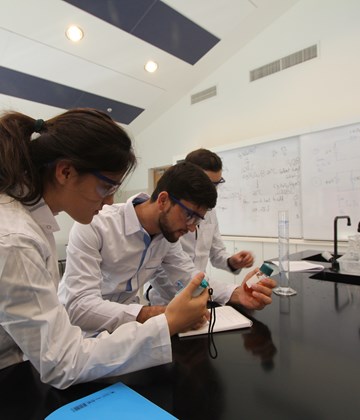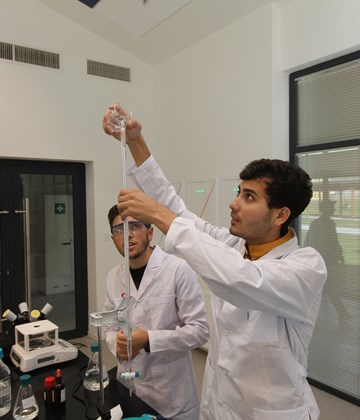
Freshman

Sophomore

Junior

Khorog campus, Tajikistan
5 years (1 year preparatory programme + 4 years bachelor's degree)
Curriculum developed in partnership with the University of British Columbia
The Earth and Environmental Sciences major at the University of Central Asia offers a comprehensive and scientifically rigorous curriculum that integrates natural sciences with social and cultural perspectives, particularly those relevant to mountain regions in Central Asia and beyond. This programme is designed to equip students with a strong foundation in Earth and Environmental Sciences while allowing flexibility to pursue specialized interests through elective courses and research opportunities.
At the heart of the EES curriculum is a transdisciplinary approach that bridges geosciences, environmental sciences, and the social sciences. Core courses in natural sciences, such as geology, biology, chemistry, and physics, are complemented by essential studies in the humanities and social sciences, fostering a holistic understanding of environmental challenges and solutions.
One of the programme’s key strengths lies in its breadth and cross-disciplinary nature. Students explore diverse areas including hydrology, geodynamics, ecology, and environmental policy. The curriculum is enriched by frequent field trips to the surrounding mountainous regions, offering hands-on experience and direct engagement with the natural environment.
Graduates of the EES major emerge with a deep understanding of the complex interplay between natural systems and human societies, particularly in fragile mountain environments, and are well-equipped to contribute meaningfully to sustainable development efforts in Central Asia and globally.
Explain the physical and chemical processes, such as plate tectonics, erosion, sedimentation, volcanism, and mineral formation, that have shaped the Earth over geological time, with a particular focus on the formation and evolution of mountainous regions.
Interpret environmental and geological data — including remote sensing, GIS datasets, field observations, and lab results — to design applied research projects and propose evidence-based solutions to environmental challenges.
Analyze geological and environmental data alongside local and indigenous knowledge systems to assess environmental trends, recognizing the value of diverse perspectives in understanding complex phenomena.
Apply environmental technologies for sustainable use of Earth resources, evaluating systems for water quality, air pollution control, and renewable energy through social, economic, and ecological lenses.
Critically analyze environmental management challenges and assess governance models and policy frameworks at local, national, and global levels with attention to equity and sustainability.
Investigate how indigenous and Western scientific knowledge systems contribute to understanding and managing human–environment relationships in mountain regions.
Communicate scientific concepts clearly and effectively to diverse audiences, fostering environmental awareness and empowering communities through culturally sensitive outreach.
The programme offers a unique selection of courses in Earth and Environmental Sciences and GIS/Remote Sensing, specifically designed for the Central Asian context and distinct from those offered by other universities in the region.
Students are taught by international faculty with extensive experience in Earth and environmental sciences, ensuring exposure to global expertise and best practices. They benefit from direct access to field sites across the region, where they can observe geological formations and environmental features first-hand, as well as from well-equipped laboratories for geology and environmental studies.
From the very first semester, the learning process is hands-on, supported by access to advanced scientific resources, specialised software, and computer facilities. The programme also provides opportunities for internships and international exchange, allowing students to gain valuable practical experience and broaden their professional networks.
Students completing a UCA undergraduate degree in Earth and Environmental Sciences should be competitive for entry into international graduate studies programmes in the areas of Earth and Environmental Sciences. They should be able to teach in local schools, find jobs in NGOs and government agencies, or work in the private sector in areas including water technologies, renewable energy, mining, industrial pollution, and climate change impacts.
Partner University in developing the curriculum: University of British Columbia, Canada
A central theme of the EES programme is the study of environmental and earth science processes that shape mountain ecosystems, and the dynamic interactions between these processes and the communities that inhabit them.

Students delve into practical and pressing topics such as:
The programme emphasises the development of analytical and problem-solving skills, encouraging students to address real-world challenges through evidence-based scientific inquiry rather than anecdotal or popular beliefs. Learning extends beyond the classroom through laboratory work, summer internships, and a capstone project, all of which prepare students for careers in environmental science, geoscience, policy-making, or further academic study.

UCA's School of Arts and Sciences is pleased to announce that applications are open for the undergraduate programmes:
Undergraduate programmes:
- BSc in Computer Science (offered in Naryn, Kyrgyzstan)
- BA in Communications and Media (offered in Naryn, Kyrgyzstan)
- BSc in Earth and Environmental Sciences (offered in Khorog, Tajikistan)
- BA in Global Economics (offered in Khorog, Tajikistan)
All programmes are taught in English and follow an international curriculum emphasizing analytical thinking, research, and community engagement. UCA students benefit from small class sizes, personalized academic support, and extensive internship and career development opportunities.
Application deadline: 14 February 2026